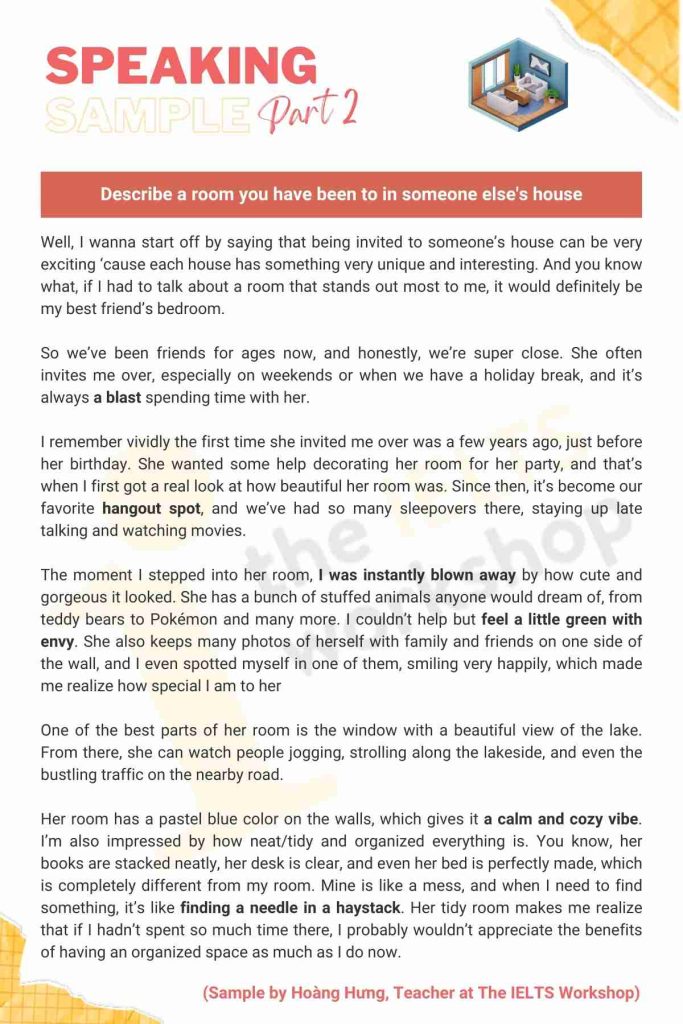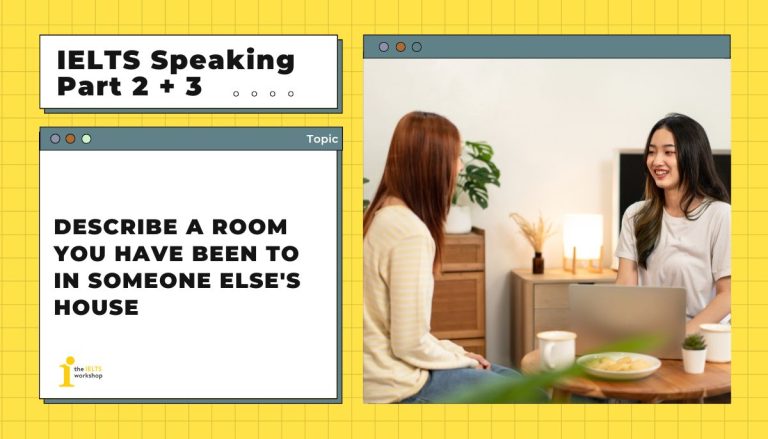Trong bài giải mẫu lần này, thầy Hoàng Hưng của The IELTS Workshop sẽ hướng dẫn bạn trả lời topic “Describe a room you have been to in someone else’s house“ trong IELTS Speaking Part 2. Cùng tham khảo sample, từ vựng và một vài cách diễn đạt ghi điểm trong phần thi IELTS Speaking nhé.
Part 2: Describe a room you have been to in someone else’s house
Describe a room you have been to in someone else’s house
You should say:
whose room it is
when you went there
how you felt about it
and explain why you have been to that person’s room.
Dưới đây là bài mẫu cho topic “Describe a room you have been to in someone else’s house”.
1. Bài mẫu (Sample)

2. Từ vựng (Vocabulary)
- a blast: một trải nghiệm, khoảng thời gian vui vẻ
- hangout spot: nơi hay gặp gỡ nhau
- I was blown away: tôi rất ngạc nhiên, ấn tượng
- feel a little green with envy: cảm thấy hơi ghen tị
- a calm and cozy vibe: một cảm giác ấm cúng, dễ chịu
- finding a needle in a haystack: mò kim đáy bể
Part 3:
Bên cạnh Part 2, bạn hãy tham khảo thêm Part 3 cho chủ đề này nhé
Do young people or old people prefer to stay at home?
Why do people invite others to their house?
Do you go to someone else’s house during the spring festival (Tet’s holiday)? Why?
1. Do young people or old people prefer to stay at home?
I suppose that older people are more inclined to stay at home compared to the younger generation. They enjoy the comfort and tranquility of their home environment, where they can relax, read, or tend to hobbies like gardening. On the other hand, younger people typically prefer going out because they’re more energetic and eager to explore the world. For instance, many teenagers and young adults like hanging out with friends, going to cafes, or attending events. That said, it really depends on individual personality rather than just age. Some young people can be homebodies too, especially if they enjoy things like gaming or watching movies.
- Be inclined to: có xu hướng làm gì
- the comfort and tranquility of: sự thoải mái, yên bình
- energetic : đầy năng lượng
- That said: tuy nhiên, dù là nói như vậy
- Homebodies: người thích ở nhà
2. Why do people invite others to their house?
Well, there are various reasons why people invite others over. One of them is to strengthen relationships. You know, hosting a gathering at home allows people to connect on a deeper level and it can always create a sense of warmth and belonging, which is often hard to achieve in public spaces. For example, families might invite relatives over for dinner to catch up or celebrate special occasions. Another reason could be to showcase hospitality or reciprocate a previous invitation.
- strengthen relationships: thắt chặt tình cảm
- create a sense of warmth and belonging: tạo ra cảm giác ấm cúng, gần gũi
3. Do you go to someone else’s house during the spring festival (Tet’s holiday)? Why?
Absolutely. Visiting other people’s homes during Tet is a significant tradition in Vietnamese culture. It’s a time to pay respects to elders, exchange New Year’s wishes, and strengthen family bonds. For instance, I usually visit my grandparents to wish them good health and happiness for the coming year. Beyond that, visiting friends or neighbors during Tet is also a wonderful way to share festive moments, exchange lucky money, and enjoy traditional foods like bánh chưng or pickled vegetables, which can foster a sense of community during the holiday season.
- exchange New Year’s wishes: gửi nhau lời chúc
- strengthen family bonds: thắt chặt tình cảm
- exchange lucky money: tặng tiền lì xì
- foster a sense of community: nuôi dưỡng cảm giác gắn bó
Bài mẫu bởi thầy Hoàng Hưng – Giáo viên The IELTS Workshop
Các bạn có thể tham khảo các bài mẫu IELTS Speaking Part 2 của The IELTS Workshop cũng như tham gia bài test trình độ tiếng Anh và nhận tư vấn lộ trình miễn phí tại đây!
Nếu bạn muốn nhận Mentor 1-1 để hoàn thiện kĩ năng Speaking của mình trước khi bước vào kỳ thi, tham khảo ngay Khóa bổ trợ từng kỹ năng IELTS của The IELTS Workshop.









